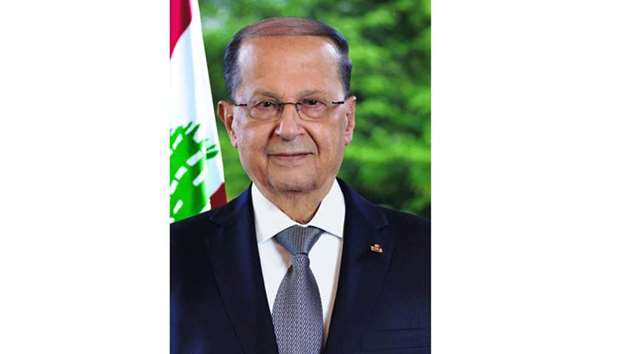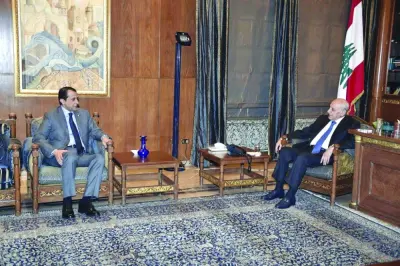Speaking to Qatar News Agency (QNA), President Aoun said that the relations between Qatar and Lebanon are based on brotherly ties that gather the two countries and their people, besides the existing co-operation not only in the political and economic matters, but also in the cultural field.
He welcomed Qatar’s support for Lebanon in oil and gas, as Qatar has an important experience in this regard while Lebanon has recently entered the oil and gas field, noting that Lebanon has not yet begun exploration, but it took the first step and will definitely benefit from the experiences of friendly countries.
On the Gulf crisis, the Lebanese president stressed the importance of dialogue as a way to resolve it, praising the efforts made by Kuwait in that regard.
He added that it was regrettable and painful to see a split between the brothers, noting that Lebanon has always called for dialogue and supported Kuwait’s efforts to converge the views of Qatar and some of the GCC countries, to the benefit of all Arab countries.
President Aoun added that Lebanon sees the drifting of Arab countries as contributing to the weakening of their collective power.
He stressed that such power must be at full force now as the Arab world needs solidarity to face its most pressing challenges, whether regarding the new image of the Middle East after the elimination of terrorist organisations, or targeting occupied Jerusalem, which is facing an isolation attempt by wiping out its history and changing its identity as a holy city.
The Lebanese president said that he has called on a number of occasions for staying alert to schemes designed to fragment the Arab world.
He stressed that he still supports any effort that will unite the Arab world, as persisting differences will harm all Arab countries and will be an end to their ability to play any role regionally or internationally.
President Aoun pointed out that the security threat is still present in Lebanon, even though Lebanon was one of the first countries to expel terrorists from its territory militarily through the Lebanese army in an operation called “Fajr Al Joroud”, in addition to the security forces efforts in dismantling terrorist networks and adopting pre-emptive security strikes that have kept Lebanon safe.
He pointed out that the battle against terrorism is long, and is not limited to security only, but must be won at the social and intellectual level as well.
He stressed that social and cultural aspects were the main drivers of terrorism.
President Aoun expressed his confidence in the ability of the Lebanese army and security forces in foiling any terrorist plots.
He stressed at the same time that the fight against terrorism is a continuous and collective effort, and that terrorism must be eradicated from its roots.
He added that this, in turn, means fighting some of the causes that lead to terrorism, such as poverty and illiteracy.
On Lebanon’s success in preventing the contagion of the war in neighbouring Syria, the Lebanese president said that the unity of the Lebanese people and their agreement to save their country from the flames engulfing the region and the wars in Syria were the secret to that success.
He stressed that the united approach to countering terrorism, and supporting the army and the security forces, were important ingredients of the success, despite the pain suffered by the Lebanese through the violent confrontations with terrorists in more than a Lebanese area.
President Aoun touched on the continuing dangers of terrorism worldwide, referring to the news of the criminal operations that the countries are witnessing permanently, whether in the Middle East, Europe or the United States.
He said that Lebanon is a peaceful country that wants the best ties with all countries based on mutual respect and sovereignty.
However, the president warned that the country’s peaceful nature does not mean that Lebanese collapse when facing danger, nothing can knee down the Lebanese people, neither terrorism nor occupation or threats, and history is a testament to that.
The Lebanese president revealed that he intends to call for an objective and effective discussion of the defence strategy (which is based on keeping arms solely in control of the Lebanese army), that takes into account all the military and security concerns that Lebanon could face, especially in light of the Israeli threats.
He stressed on the need for consensus among all the Lebanese parties on the implementation of this strategy.
The president said that the defence strategy cannot be imposed, but must be agreed upon.
He added that the strategy must also take into account the special circumstances in Lebanon which has to defend its borders with very modest capabilities in light of the “veto” that is placed against the country in terms of getting specific weapons, while maintaining security and stability inside.
The Lebanese president discussed the impact of hosting 850,000 Syrian refugees displaced in Lebanon.
He highlighted that his country repeatedly called for a solution to this tragedy, both for those displaced who are living in very difficult circumstances, and for Lebanon that is already facing problems in meeting the needs of its citizens.
He added that Lebanon can no longer bear the consequences of the large number of refugees, which are increasingly affecting the Lebanese.
Unemployment rose to 46%, and the rate of ordinary crimes increased to about 60%. The Lebanese infrastructure is also unable to deal with the enormous pressure on services, referring at the same time to the existence of about half a million Palestinian refugees living in Lebanon.
He pointed out that Lebanon is seeking the return of those displaced back to Syria, especially that most of the areas were liberated and are war free.
He pointed out that the assistance allocated by Lebanon to the Syrian refugees were not as hoped for and did not pass through the Lebanese state, which he felt was strange.
He called on participants in the Brussels conference that will discuss the Syrian refugees issue to secure the return of those displaced back home.
In response to a question on the success of Lebanon in adopting a neutral policy regarding regional conflicts, President Aoun said that Lebanon is a country calling for rapprochement and dialogue, and has applied for its adoption as a country for the dialogue of civilizations and religions under the auspices of the United Nations, expressing the hope that the differences between Arab countries and some Arab countries and Iran will end.
He stressed that Lebanon enjoys good relations with both Iran and Saudi Arabia, and does not wish to see the relationship deteriorate because that would affect the whole region.
He pointed out that Lebanon has suffered from wars of others on its land, and recognises that it will pay dearly the price of any external conflict, therefore, the involved parties in Lebanon agreed to maintain good relations with the two countries.
President Aoun said that Israel remains a threat to Lebanon just as it was during the Palestinian setback.
He added that Lebanon has been paying a heavy price daily since the last century and is still facing the Israelis on the ground and morally.
He added that Israel realises that Lebanon is not a war-hungry country, but it also knows that Lebanon would respond with all its strength to any war waged against it, noting that this was tested back in 2006.
Although Lebanon does not have the military capability and arsenal of weapons owned by Israel, the Lebanese president affirmed that his country knows how to use what it has to respond strongly.
He believed that Israel would think twice before waging a new war against Lebanon, because it knows Lebanon would be ready to respond.
He stressed that Lebanon continues to rely on the United Nations in supporting its just causes, and it respects all international resolutions including Security Council Resolution 1701, but the same can not be said of Israel.
Talking about the steps taken immediately after his election as president on the economic front, he stressed that the first step taken in this area was to move Lebanon from a rental economy to a productive economy, and to involve the private sector, while the second step aimed at implementing this concept through new laws and a practical plan based on international studies and consultations in specialised fields.
He added that Lebanon has approved budgets for the years 2017 and 2018 after it was deprived of budgets for more than a decade, in addition to awarding companies to explore for oil and gas for the first time in the history of Lebanon.
He pointed out the development of a five-year economic plan was praised by world countries, referring to the conference held in Paris recently which, he said, reflected the international confidence in the Lebanese will and the vision of the state to promote the economy, where the countries, including Qatar, pledged $11bn in loans and grants to help Lebanon implement its economic plan.



